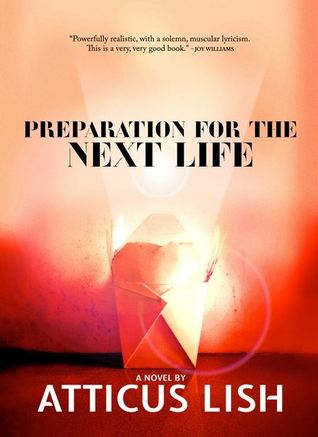Review: PREPARATION FOR THE NEXT LIFE by Atticus Lish

Review by ELIZABETH MIKESCH
This is what we should be reading right now. Most writers aren’t generous enough to generate books this clean or of heft. Books about what it means to be an American feel clammy and flaccid. We’re usually asked to quietly and safely consider what already makes sense. I’ve yet to be moved by a contemporary novel daring to sum it all up because they lack agility in rendering the “all-seeing” approach to storytelling and resume summoning trite, too often self-congratulatory, overly assertive litanies summarizing, based on conjecture and not investment, fraught by research and data and not driven by the violent coming to of a realization that life isn’t now . Shouldn’t literature train us to become comfortable with not knowing?
Here, Atticus Lish transcends authorship to invite our minds to delve into the hellscapes of the disenfranchised forging new lives post-9/11 in Queens. Zhou Lei, an illegal Chinese immigrant, and Skinner, a vet back from three tours in Iraq, seek respite in each others’ survivor vibes in 24-hour McDonald’s and KFCs, in extreme workouts, in the streets and in shitty bars, and in run-down homes living among hostile strangers. All- language barriers, poverty, mental illness, sociopathic felons, and ultimately, America- is against them. You awaken for these characters in ways you couldn’t if you saw yourself in them; they have real problems- ones you probably can’t fathom.
The plot centers around the couple wanting citizenship for Zhou Lei and some mental health for Skinner, but doubting one another’s sincerity, they erupt regularly. One of the most gorgeous excerpts followed Skinner chasing after Zhou Lei for miles on end in the darkness after a quarrel, lost all throughout the city.
Saturated with dark energy, the sky glowed like a television screen after the power gets turned off. On either wing, he saw distant lights and buildings. He was running in an endless field. He tripped but didn’t fall. It cost too much to swear. Even to think what he would say. His horrendous breathing was disconnected from him. The next time he raised his head, he saw amber vapor lights coming through the trees.
So much of what Lish injects Skinner with sears. The language occasionally erupts into lyricism, like this passage. Mostly, the saying of the story is swift, unfussy, and meant I hope for independent cinema. The writing feels scriptish and well-shot, and the characters beyond the real, but well-read, aesthetic would burn into our eyes and guts.
Some of the vignettes outside the main story center around villainous Jimmy, the son of Skinner’s renter. Straight out of prison, Jimmy is jobless and spends much of his time manipulating his family and mingling between spats with other locals. Much we glean of Jimmy is not through what he says, but through his stance and associations. The most gut-wrenching scene of sexual assault I’ve ever read is executed by Lish in decreased language that’s plain and packed. We see the moment for what it is, not how he feels about it. Life goes on.
He looked like a man on a child. The child’s head was mummified. Then he went into another frenzy when he had his wind back. She gagged and threw up in the towel he wrapped her head in. There were ramen noodles in her stomach. You got the virus now, he told her as he was pulling up his jeans.
The content is paced steadily. While the first thirty or so pages is term-laden and somewhat of a stitch, you’re trained to keep up with the shades drawing, the violent dreams and flashbacks, and the rattled cognition endured, especially by Skinner. Life is a series of marathons. It’s like our hero and heroine need to match their outsides to their brutalized insides, so they push their bodies to the brink. The common languages between them are trauma bonding, fast food, and Spartan-style exercise, but the terror of displacement, violence, incarceration, and certain doom looms over their ability to be rebirthed divisibly or as a whole couple. Their physical prowess serves as a sort of momentum for the chaotic process of their attempted rebirths. While Skinner deteriorates watching footage of Iraqis being blown up by soldiers in a drugged out, booze-spiked hum, Zhou Lei skitters around all day and night at work in a Chinese mall buffet in her filthy shoes, exhausted but still doing lunges to maintain her stamina.
Lish’s inaugural novel is contemporary, raw, and stylistically instinctual- almost bare. Departing from the inky humor and the singular, genius truth of his comics in Life is with People also put out by the sharp, subversive Tyrant Press, to set an honest, somber tale of the anti-recovery of our country. Restoration is hopeless for America, but Lish is patriotically pessimistic. He doesn’t seem to want your awards or applause, though they’re certainly due. The prose feels stoic and self-made. It has heart, but it won’t hug. We’re shown through Zhou Lei and Skinner that we won’t master this life in our dying world no matter what we choose to nurture us. We can die or adapt.